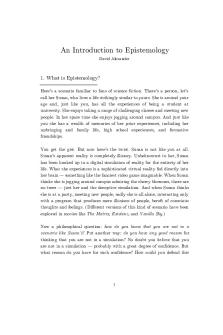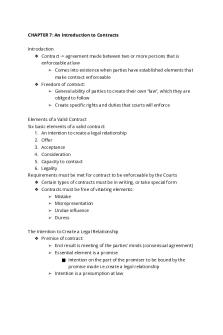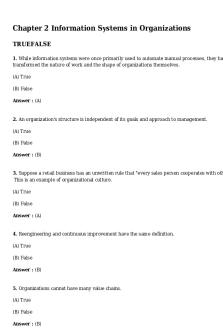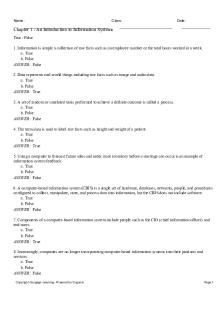Chapter 7 An Introduction to Contracts PDF

| Title | Chapter 7 An Introduction to Contracts |
|---|---|
| Course | Elements of law part 1 |
| Institution | York University |
| Pages | 7 |
| File Size | 268.9 KB |
| File Type | |
| Total Downloads | 76 |
| Total Views | 159 |
Summary
Chapter 7 Lecture Notes...
Description
CHAPTER 7: An Introduction to Contracts Introduction ❖ Contract -> agreement made between two or more persons that is enforceable at law ➢ Comes into existence when parties have established elements that make contract enforceable ❖ Freedom of contract: ➢ General ability of parties to create their own “law”, which they are obliged to follow ➢ Create specific rights and duties that courts will enforce Elements of a Valid Contract Six basic elements of a valid contract: 1. An intention to create a legal relationship 2. Offer 3. Acceptance 4. Consideration 5. Capacity to contract 6. Legality Requirements must be met for contract to be enforceable by the Courts ❖ Certain types of contracts must be in writing, or take special form ❖ Contracts must be free of vitiating elements: ➢ Mistake ➢ Misrepresentation ➢ Undue influence ➢ Duress The Intention to Create a Legal Relationship ❖ Premise of contract: ➢ End result is meeting of the parties’ minds (consensual agreement) ➢ Essential element is a promise ■ Intention on the part of the promiser to be bound by the promise made i.e.create a legal relationship ➢ Intention is a presumption at law
Presumptions ❖ Presumptions in contract law ➢ Strangers intend to be bound by their promises ➢ Family members and close friends do not intend to be bound in contracts ➢ Both are presumptions that can be rebutted ❖ Invitation to do Business ➢ Advertisements are not offers ➢ Invite offers that seller may accept or reject Carlill v. Carbolic Smoke Ball Co.[1893] ❖ Weird smoke company, said that they would give $100 to anyone who got influenza from their product ➢ Someone ended up getting it, sued and the court felt that Carbolic was pushing it, and allowed the person to get the $100 reward ❖ Key to the decision was the deposit of money in order to pay the reward. ❖ Prior to this decision advertisers could make any claim and stand behind it as ‘puffery’ ❖ Now, most promises in ads follow this precedent although advertisers still have great scope in claims like “works great”or “best product”
Intention of the Parties
Offer and Acceptance ❖ Nature of an offer ➢ Only a promise made with intention of creating a legal relationship may be enforced ➢ A promise is tentative, until the other party accepts proposal i.e.to comply with the condition(s) Acceptance of an Offer ❖ Acceptance -> a statement or act given in response to and in accordance with an offer ➢ RULE: Acceptance of the offer must be communicated to the offeror in the manner requested or implied by the offeror in the offer ➢ RULE (for an offer accepted by post): the acceptance of the offer takes place when the letter of acceptance, properly addressed and the postage is paid, is placed in the postbox Nature of Acceptance ❖ Must be clear and unconditional ❖ Counteroffer is a new offer and a rejection of original offer ❖ Silence cannot be considered acceptance unless there is a pre-existing agreement ❖ Legislation (Common Law) protects consumers: ➢ Public not obliged to pay for unsolicited goods ➢ Not liable for goods lost or damaged while in their possession
Nature of Acceptance Cont’d… ❖ Unilateral agreements –offers that require offerees to complete their part of the contract as a mode of acceptance ➢ An offer made to the world at large ➢ Completing or performing the act is acceptance ➢ Offeror cannot revoke offer so long as offeree is in the course of performing their part’ Forms of Acceptance
Location of the Transaction ❖ Place of offer/acceptance determines location of contract and jurisdiction that governs it ❖ Data messages are deemed dispatched from the originator’s place of business ➢ Deemed received at the addressee’s place of business ❖ Location of contract determines: ➢ Jurisdiction whose laws apply to contract ➢ Applicable sales or income taxes Effect and Timing of the Click ❖ Electronic business contracts must include valid offer and acceptance ➢ Radio button and click box ➢ Click-wrap agreement -> internet click box of “I agree” which constitutes valid acceptance of enumerated contractual responsibilities
Lapse of an Offer ❖ Lapse -> termination of an unaccepted offer by the passage of time, a counteroffer, or the death of a party ❖ Until offer accepted, no legal rights or obligations ❖ If offer rejected outright, it lapses and cannot be revived except by offeror ❖ Offers may also lapse by passage of time ■ Stated time in the offer expires ■ If not stated, after a reasonable period of time Revocation of an Offer ❖ Revocation -> termination of an offer by notice communicated to the offeree before acceptance ➢ Offeror may revoke the offer at any time prior to acceptance ➢ Revocation must be communicated to the offeree ➢ Can be communicated in any form as long as it is communicated and received ❖ Option -> a separate promise to keep an offer open for a period of time ➢ Requires consideration or signed under seal ❖ Indirect revocation: ➢ Revocation can be communicated through someone else (indirect) ➢ Must prove offeree had notice of revocation indirectly from a reliable source
Example Problem• A placed a sign on his car that read “For Sale $5,000.00” B wrote a cheque for $5,000.00 and mailed it to A The next day C offered A $4,000.00 and A accepted. C paid cash and said he would return for the vehicle in 2 days. A and C shook hands The following day B’s cheque arrived and A cashed the cheque and called C to return C’s money. Using what you know about contracts, explain what has happened here. 1)A’s sign was a(n) Invitation and therefore cannot be accepted 2)Because B’s cheque was a(n) offer 3)The vehicle transferred to C when C’s offer was accepted 4)What must A do to comply with the law? Since B’s cheque was an offer for property no longer belonging to A, A could not accept it and must return B’s money and give C the car. Offer and Acceptance
Summary ❖ Law of contract allows parties to establish their own rights and duties ➢ Follows series of rules for formation of contract ➢ Promises enforced by the courts ❖ Contracts must contain several key elements: ➢ “Meeting of the minds of the parties” -> intention of both parties to create legal relationship ➢ Offer of a promise by one party subject to some condition ➢ Offer properly accepted by other party ❖ If offer not properly accepted: ➢ No contract will exist ➢ Offer may be terminated or replaced by counteroffer ➢ Contract may lapse due to passage of time, counteroffer, or death of party ➢ Offeror may withdraw offer (revocation) unless option is given...
Similar Free PDFs

Chapter 7 Voidable Contracts
- 3 Pages

An introduction to Psychology
- 4 Pages

An introduction to sociolinguistics
- 451 Pages

1. An Introduction to Epistemology
- 10 Pages

1. An Introduction to Glaciers
- 6 Pages

How to write an Introduction
- 3 Pages
Popular Institutions
- Tinajero National High School - Annex
- Politeknik Caltex Riau
- Yokohama City University
- SGT University
- University of Al-Qadisiyah
- Divine Word College of Vigan
- Techniek College Rotterdam
- Universidade de Santiago
- Universiti Teknologi MARA Cawangan Johor Kampus Pasir Gudang
- Poltekkes Kemenkes Yogyakarta
- Baguio City National High School
- Colegio san marcos
- preparatoria uno
- Centro de Bachillerato Tecnológico Industrial y de Servicios No. 107
- Dalian Maritime University
- Quang Trung Secondary School
- Colegio Tecnológico en Informática
- Corporación Regional de Educación Superior
- Grupo CEDVA
- Dar Al Uloom University
- Centro de Estudios Preuniversitarios de la Universidad Nacional de Ingeniería
- 上智大学
- Aakash International School, Nuna Majara
- San Felipe Neri Catholic School
- Kang Chiao International School - New Taipei City
- Misamis Occidental National High School
- Institución Educativa Escuela Normal Juan Ladrilleros
- Kolehiyo ng Pantukan
- Batanes State College
- Instituto Continental
- Sekolah Menengah Kejuruan Kesehatan Kaltara (Tarakan)
- Colegio de La Inmaculada Concepcion - Cebu









